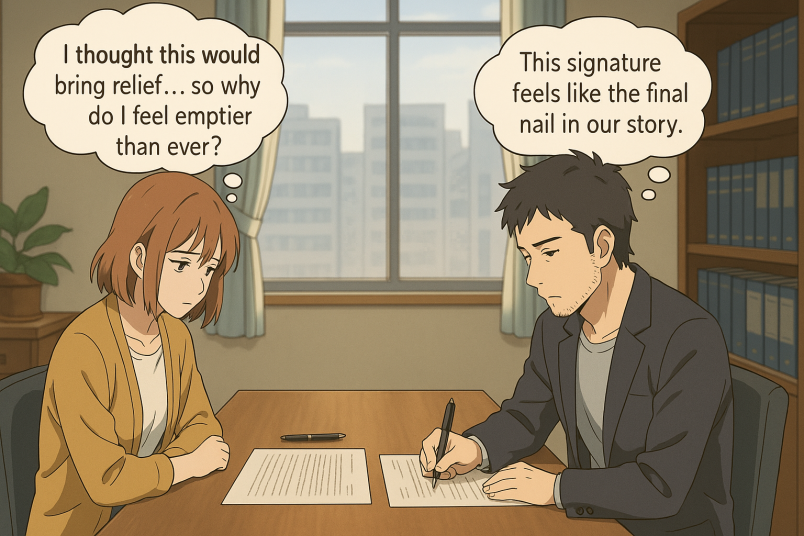7 Practical Tips for Coping With Divorce Regret and Moving On

Unlock Daily 30-Sec Tips for a Happier Relationship
👉 Subscribe FREEKey Takeaways
Marriage.com AI Quick Summary
Divorce can feel like closing a chapter you once thought would last forever.
Some days bring relief, other days an ache you can’t quite name… and then there’s the heavy silence that makes you wonder, “Did I do the right thing?”
It’s normal to wrestle with those thoughts, to regret divorce in quiet moments when the house feels too still or when memories come rushing back unexpectedly.
Regret doesn’t always mean you made the wrong choice; it often reflects the depth of what you’ve lost, the love, the shared routines, the dreams once built together. Healing, though, is never a straight line; it’s messy, confusing, sometimes surprisingly beautiful, and always deeply human.
What is divorce regret, and why does it happen?
Divorce regret is that lingering feeling when you start to wonder if ending your marriage was truly the best choice. It’s not always dramatic or constant; sometimes it’s a quiet ache that surfaces when you least expect it.
Maybe it shows up in moments of loneliness, or when old photos bring back a flood of memories.
A study examined people who had gone through a divorce to determine whether they avoid regret and prefer keeping things the same. Researchers created special questionnaires to measure both. They found that many divorced people do try to avoid regret, and they also tend to stick with the familiar instead of making new changes.
Regretting divorce doesn’t mean you failed—it simply means you’re human, reflecting on love, loss, and the life you once shared. And yes, those mixed emotions can feel confusing, even overwhelming at times.
-
Why does it happen?
Divorce regret often happens because emotions and reality don’t always align. You may miss companionship, stability, or shared dreams, even if the relationship itself was unhealthy.
Nostalgia, guilt, and sudden life changes can magnify those feelings, making you question choices that once felt clear. It’s part of the complex process of grieving what was lost while adjusting to what’s new.
7 practical tips for coping with divorce regret and moving on
Divorce regret can feel heavy, confusing, and deeply personal. Some people even find themselves thinking, “I regret divorcing my husband for another man or vice versa,” and that thought alone can stir up shame, sadness, or guilt.
But regret doesn’t always mean you made the wrong choice—it often means you’re simply grieving what was lost while learning how to rebuild. Healing takes time, but there are gentle ways to cope, grow, and slowly find peace again.
1. Allow yourself to grieve the loss
Grief is not just for death—it’s also for endings, changes, and dreams that never unfolded. Divorce takes away not only a partner but also routines, comfort, and stability. It’s natural to feel sadness, anger, or confusion, and none of these emotions means you’re weak.
Give yourself permission to cry, reminisce, and acknowledge what hurts. Bottling it up only prolongs the pain, while expressing it can bring relief. Journaling, art, or simply talking with a trusted friend can help. By facing grief instead of avoiding it, you start to clear space for healing.
Here’s what you can do:
- Set aside quiet time each week just to process your emotions, whether through journaling or reflection.
- Create a playlist of songs that let you cry or release emotions without judgment.
- Share your feelings with one trusted person rather than isolating yourself.
2. Challenge “what if” thinking
It’s easy to spiral into thoughts like, “What if I’d tried harder?” or “What if we had gone to counseling?”
While reflection can be useful, endless “what ifs” only deepen regret, so recognize when your mind is looping and remind yourself that the past can’t be changed, only learned from.
You can replace “what if” with “what now,” which shifts focus toward healing. This isn’t about denying mistakes but about choosing not to live in them. With practice, these mental shifts make daily life feel lighter.
Here’s what you can do:
- When “what if” thoughts arise, write them down and counter each with one “what now” action.
- Use grounding techniques like deep breathing or counting objects around you to break mental loops.
- Repeat affirmations such as “I can’t change the past, but I can choose my next step.”
3. Talk it out with someone you trust
Carrying regret alone makes it feel heavier. Speaking with a close friend, family member, or therapist can bring comfort and clarity. Sometimes just saying the words out loud reduces their power. You may discover that others have felt the same struggles, which helps you feel less alone.
Researchers explored social support in traumatic grief, finding low satisfaction with professional, family, and community help. Pets provided the most comfort. Emotional support was most desired, highlighting gaps in understanding what grieving individuals perceive as helpful, especially post-pandemic.
A professional can also guide you in separating helpful self-reflection from self-blame. These conversations remind you that healing is not meant to be a solo journey. Sharing your feelings can be the first step toward self-acceptance.
Here’s what you can do:
- Schedule weekly check-ins with a friend or family member for open, honest talks.
- Consider joining a local or online support group for divorced individuals.
- Book at least one therapy session to explore your feelings in a safe, structured space.
4. Focus on lessons learned instead of mistakes
Every ending carries wisdom, even if it feels painful.
Instead of fixating on what went wrong, ask yourself: What did this experience teach me about love, trust, or boundaries?
Lessons can become building blocks for a healthier future. Recognizing growth makes regret feel less like failure and more like transformation. Even painful choices can shape resilience and clarity.
Over time, you’ll see that the marriage was not wasted—it was a chapter that prepared you for the next. Shifting perspective in this way lightens the emotional burden.
Here’s what you can do:
- Write down three lessons you’ve learned from your marriage and how they can guide your future.
- Reframe one painful memory by focusing on what it taught you about yourself.
- Keep a journal where you track small wins that show your personal growth.
5. Reconnect with your personal identity and passions
Divorce often leaves people wondering, “Who am I without this relationship?”
Rediscovering yourself is a healing journey. Start with small joys: hobbies, old passions, or new interests that remind you of your individuality. This helps rebuild confidence and shifts your attention away from regret.
Exploring your identity outside of marriage opens up new possibilities for happiness. Whether it’s cooking, painting, traveling, or simply spending time with friends, these activities remind you of your worth. Each step back into yourself adds strength. Slowly, you’ll see that life holds joy beyond your past relationship.
Here’s what you can do:
- Revisit an old hobby you loved before your marriage, even if only for a few minutes a week.
- Make a bucket list of new activities you’d like to try within the next year.
- Surround yourself with friends who support your individuality and encourage exploration.
6. Build healthy routines for stability
Regret often feels worse during long, unstructured hours when your mind has too much space to wander. Creating a daily routine—whether it’s exercise, meditation, or scheduled meetups—provides grounding. Healthy habits also support emotional recovery by keeping your body and mind in balance.
Structure creates small wins each day, which counterbalance regretful thoughts. A morning walk or an evening gratitude practice can be surprisingly soothing. Over time, these routines make your world feel more predictable and safe again. Stability is a gift you can give yourself while moving forward.
Here’s what you can do:
- Start your day with a 10-minute ritual like stretching, meditation, or journaling.
- Set regular sleep and meal times to give your body a sense of rhythm.
- Add one activity to your weekly calendar that brings joy and connection.
7. Look forward and set small goals
Dwelling in the past keeps you stuck, but looking ahead—even in small ways—creates momentum. Begin with achievable goals, like taking a class, starting a side project, or planning a trip. These milestones give you something positive to anticipate. Small goals shift energy toward possibility rather than regret.
With each one, you’ll notice your confidence growing. Eventually, long-term dreams will feel reachable again. Progress is built on tiny steps, and each step forward helps you feel less weighed down by yesterday’s choices. Moving forward is possible—even if it’s just one small step at a time.
Here’s what you can do:
- Set one small weekly goal, such as cooking a new recipe or reading a new book.
- Create a vision board with future goals, no matter how small they seem now.
- Celebrate each step forward by acknowledging your progress out loud or writing it down.
Watch this TED Talk, in which Dr. Antonio Pascual-Leone, a clinical psychologist and professor, explains how to deal with emotional baggage after a breakup. He shares a simple 3-step process to help you process unfinished feelings and move forward with greater clarity and peace:
Can divorce regret ever lead to reconciliation?
Sometimes people who regret divorce wonder if reconciliation is possible. The truth is that it depends on many things: the reasons the marriage ended, whether both partners have grown, and whether trust can truly be rebuilt.
Regretting divorce doesn’t always mean going back is the right choice, but for some, it opens the door to reflection and even second chances. Reconciliation can work only when both people are committed to starting fresh, not just repeating old patterns. It takes patience, humility, and honest communication.
- Be honest about why the marriage ended
- Talk openly about expectations and changes
- Make sure trust can be rebuilt step by step
Reconciliation is never guaranteed, but it can be meaningful when both partners share the same hope. And if it doesn’t happen, healing and growth are still within reach. Life can hold love in many forms—sometimes familiar, sometimes new.
Moving forward with hope
Coping with divorce regret isn’t about erasing the past—it’s about learning to live with it in a softer, kinder way. Some days may feel heavy, others lighter, and that’s perfectly normal. Regret can sometimes be a teacher, showing us where healing is needed and where new beginnings can bloom.
You don’t have to have all the answers right now; small steps forward matter more than perfect ones. Remember, you’re not defined by what ended but by the strength and compassion you carry into what’s next.
 Tips
Tips
Write your tip or submit a video tip
All tips are reviewed before the publishing.
Share this article on
Want to have a happier, healthier marriage?
If you feel disconnected or frustrated about the state of your marriage but want to avoid separation and/or divorce, the marriage.com course meant for married couples is an excellent resource to help you overcome the most challenging aspects of being married.
Related Articles
Recent Articles
Related Quizzes
Unlock Daily 30-Sec Tips for a Happier, Healthier Relationship
👉 Subscribe FREE on YouTube We'd love your feedback!
We'd love your feedback!
 Expert Q&A
Expert Q&A
Ask your question related to this topic & get the support you deserve from experts.



















 Thanks for your feedback!
Thanks for your feedback!